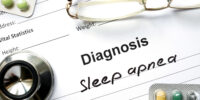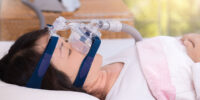What Is The Role Of Nutrition In Sleep Apnea Management?

Sleep apnea is a common sleep disorder characterized by interrupted breathing during sleep, leading to poor sleep quality and various health complications. While there are several treatment options available for sleep apnea, the role of nutrition in its management is often overlooked. However, emerging research suggests that diet plays a crucial role in managing sleep apnea symptoms and promoting better sleep quality.
This article aims to explore the relationship between nutrition and sleep apnea management. It will discuss the impact of diet on sleep apnea symptoms, the role of weight management in sleep apnea, the importance of a balanced diet, and specific nutrients that support healthy sleep patterns. Additionally, it will shed light on the effects of alcohol and caffeine on sleep apnea and provide practical tips on incorporating sleep-friendly foods into one’s diet.
By understanding the role of nutrition in sleep apnea management, individuals with this condition can make informed dietary choices that may help alleviate symptoms and improve their overall sleep quality. Consulting with a registered dietitian can further enhance the effectiveness of nutrition interventions in sleep apnea management.
Key Takeaways
- A balanced diet plays a crucial role in managing sleep apnea symptoms and promoting better sleep quality.
- Avoiding high-fat and processed foods, as well as heavy meals before bedtime, can improve sleep quality and reduce the severity of sleep apnea symptoms.
- Including fruits, vegetables, whole grains, and lean proteins in the diet provides essential nutrients and supports overall health in individuals with sleep apnea.
- Limiting or avoiding alcohol and caffeine consumption is important to promote better sleep quality and effectively manage sleep apnea.
Understanding Sleep Apnea and its Effects on Health
Sleep apnea is a serious sleep disorder characterized by repetitive episodes of complete or partial obstruction of the upper airway during sleep, resulting in fragmented sleep and decreased oxygen levels. This disorder affects approximately 3-7% of the general population and is associated with various health risks.
It has been linked to an increased risk of cardiovascular disease, hypertension, obesity, and insulin resistance. Sleep apnea can also lead to excessive daytime sleepiness, cognitive impairment, and decreased quality of life.
To manage sleep apnea, various treatment approaches are available, including continuous positive airway pressure (CPAP) therapy, oral appliances, and lifestyle modifications. Among these, nutrition plays a crucial role in sleep apnea management.
A balanced diet can help in weight management, which is important as obesity is a significant risk factor for sleep apnea. Additionally, certain dietary changes, such as reducing alcohol consumption and avoiding heavy meals before bedtime, can improve sleep quality and reduce the severity of sleep apnea symptoms.
The Impact of Diet on Sleep Apnea Symptoms
Dietary choices significantly influence the severity of symptoms experienced by individuals with sleep apnea. Certain foods and beverages can exacerbate the condition, while others can help alleviate symptoms and improve sleep quality. A balanced diet that promotes overall health is crucial for managing sleep apnea.
To better understand the impact of diet on sleep apnea symptoms, a table is provided below:
| Foods and Beverages to Limit | Foods and Beverages to Include | Foods and Beverages to Avoid |
|---|---|---|
| High-fat foods | Fruits and vegetables | Alcohol |
| Processed foods | Whole grains | Caffeine |
| Dairy products | Lean proteins | Spicy foods |
By avoiding high-fat and processed foods, individuals with sleep apnea can reduce inflammation and excess weight, which can worsen symptoms. Incorporating fruits, vegetables, whole grains, and lean proteins can provide essential nutrients and support overall health. Alcohol, caffeine, and spicy foods should be avoided as they can disrupt sleep patterns and worsen sleep apnea symptoms. Making mindful dietary choices can play a significant role in managing sleep apnea and improving sleep quality.
The Role of Weight Management in Sleep Apnea
Weight control plays a pivotal role in the management of symptoms associated with sleep apnea. Proper weight management can significantly improve sleep apnea symptoms and even lead to the resolution of the condition in some cases.
Here are three ways in which weight management can help in the management of sleep apnea:
- Reduction in upper airway obstruction: Excessive weight can contribute to the narrowing of the upper airway, leading to increased airway resistance during sleep. By losing weight, individuals can reduce the amount of excess tissue in the throat, thus reducing airway obstruction.
- Decreased inflammation: Obesity is associated with chronic low-grade inflammation, which can contribute to the development and progression of sleep apnea. Weight loss has been shown to reduce markers of inflammation, leading to improved sleep apnea symptoms.
- Enhanced effectiveness of other treatments: Weight loss can enhance the effectiveness of other sleep apnea treatments, such as continuous positive airway pressure (CPAP) therapy. Losing weight can reduce the pressure required to keep the airway open, making CPAP therapy more comfortable and effective.
Weight management plays a crucial role in the management of sleep apnea symptoms. Losing weight can reduce airway obstruction, decrease inflammation, and enhance the effectiveness of other treatment options.
The Importance of a Balanced Diet
Proper nutrition is essential for maintaining a healthy body and can have a profound impact on overall well-being and quality of life. When it comes to managing sleep apnea, a balanced diet becomes even more crucial. Consuming nutrient-rich foods can help reduce inflammation, improve breathing, and support weight management, which are all important factors in sleep apnea management.
A balanced diet for sleep apnea should include a variety of foods from different food groups, such as fruits, vegetables, whole grains, lean proteins, and healthy fats. These foods provide essential vitamins, minerals, antioxidants, and fiber that promote overall health and help alleviate sleep apnea symptoms.
To make it easier to understand, here is an example of a balanced diet for sleep apnea:
| Food Group | Example Foods |
|---|---|
| Fruits | Apples, oranges, berries |
| Vegetables | Spinach, broccoli, carrots |
| Whole Grains | Quinoa, brown rice, whole wheat bread |
| Lean Proteins | Chicken breast, fish, tofu |
| Healthy Fats | Avocado, nuts, olive oil |
Incorporating these nutrient-dense foods into one’s diet can support sleep apnea management and contribute to better sleep quality and overall health.
Nutrients that Support Healthy Sleep Patterns
Adequate intake of specific nutrients can significantly influence the quality of one’s sleep patterns, leading to improved restorative sleep and overall well-being.
Certain nutrients have been found to support healthy sleep patterns. Magnesium, for instance, plays a crucial role in regulating neurotransmitters involved in sleep. It also helps relax muscles and promote a restful state.
Additionally, calcium aids in the production of melatonin, a hormone that regulates the sleep-wake cycle.
Vitamin D has also been associated with sleep quality, as it helps regulate the body’s internal clock.
Other nutrients, such as tryptophan, B vitamins, and omega-3 fatty acids, have been linked to improved sleep quality and duration.
Incorporating a balanced diet that includes these nutrients may help manage sleep apnea and promote better sleep.
The Effects of Alcohol and Caffeine on Sleep Apnea
The consumption of alcohol and caffeine has been shown to have significant effects on the occurrence and severity of sleep apnea. Alcohol intake can relax the muscles in the throat, leading to airway obstruction and increasing the frequency of apnea events during sleep. Additionally, alcohol can disrupt the normal sleep cycle, resulting in poor sleep quality and exacerbating sleep apnea symptoms.
On the other hand, caffeine acts as a stimulant that can interfere with the ability to fall asleep and maintain deep sleep. It can also increase the frequency of nighttime awakenings, further disrupting the sleep pattern of individuals with sleep apnea.
Hence, individuals with sleep apnea are advised to limit or avoid alcohol and caffeine consumption to promote better sleep quality and effectively manage their condition.
Negative effects of alcohol on sleep apnea:
- Increased airway obstruction
- Disruption of the sleep cycle
Negative effects of caffeine on sleep apnea:
- Insomnia and difficulty falling asleep
- Frequent nighttime awakenings
Incorporating Sleep-Friendly Foods into Your Diet
Incorporating dietary choices that promote restful sleep can help individuals with sleep apnea achieve a more peaceful and uninterrupted night’s rest. Certain foods can aid in improving sleep quality and reducing the symptoms of sleep apnea. For instance, consuming foods rich in tryptophan, such as turkey, eggs, and nuts, can increase serotonin levels and promote relaxation. Additionally, incorporating foods high in magnesium, such as spinach, avocado, and bananas, may help relax the muscles and improve breathing during sleep. On the other hand, it is important to avoid foods that can exacerbate sleep apnea symptoms, such as those high in saturated fats and sugars. It is recommended to maintain a balanced diet and consult with a healthcare professional or registered dietitian for personalized dietary recommendations.
| Sleep-Friendly Foods | Benefits |
|---|---|
| Turkey | Rich in tryptophan, promotes relaxation |
| Spinach | High in magnesium, relaxes muscles |
| Avocado | Contains magnesium, aids breathing |
| Bananas | High in magnesium, improves sleep |
| Eggs | Rich in tryptophan, promotes relaxation |
| Nuts | Contains tryptophan, aids relaxation |
Consultation with a Registered Dietitian for Sleep Apnea Management
Consultation with a registered dietitian can provide valuable guidance and expertise in developing a tailored dietary plan to address the specific needs and challenges associated with managing sleep apnea.
Sleep apnea is a sleep disorder characterized by pauses in breathing or shallow breathing during sleep. It can lead to disrupted sleep, excessive daytime sleepiness, and other health complications.
A registered dietitian can assess an individual’s nutritional needs and make recommendations to optimize sleep quality and manage sleep apnea symptoms. They can provide guidance on incorporating sleep-friendly foods into the diet, such as foods rich in magnesium, tryptophan, and melatonin.
Additionally, a dietitian can help identify and address any nutrient deficiencies that may be contributing to sleep apnea symptoms.
By working closely with a registered dietitian, individuals with sleep apnea can develop a personalized dietary plan that supports their overall sleep health.
Frequently Asked Questions
How is sleep apnea diagnosed?
Sleep apnea is typically diagnosed through a sleep study, which involves monitoring a person’s breathing patterns, heart rate, and other physiological markers while they sleep. This allows healthcare professionals to determine the severity of the condition and develop an appropriate treatment plan.
What are the treatment options for sleep apnea?
Treatment options for sleep apnea include continuous positive airway pressure (CPAP) therapy, oral appliances, surgery, and lifestyle changes. While nutrition may play a role in overall health, there is limited evidence on its specific impact on sleep apnea management.
Can sleep apnea be cured through diet and nutrition alone?
Sleep apnea cannot be cured through diet and nutrition alone. While a healthy diet and maintaining a proper weight can help manage symptoms, treatment options such as continuous positive airway pressure (CPAP) therapy are necessary for long-term control of the condition.
Are there any specific foods or nutrients that can worsen sleep apnea symptoms?
Certain foods and nutrients can worsen sleep apnea symptoms. For example, high-fat and high-sugar foods can contribute to weight gain and obesity, which are risk factors for sleep apnea. Additionally, alcohol and caffeine can disrupt sleep patterns and exacerbate symptoms.
Can weight loss alone improve sleep apnea symptoms?
Weight loss alone can improve sleep apnea symptoms by reducing excess fat deposits in the upper airway, which can lead to improved airway patency during sleep. However, the role of nutrition in sleep apnea management is multifactorial and should be considered alongside other treatment approaches.











